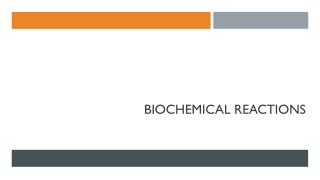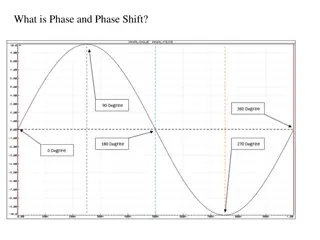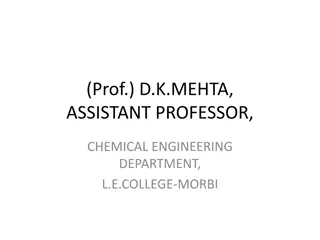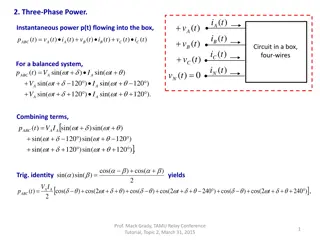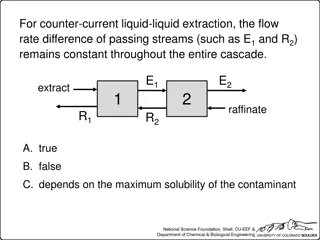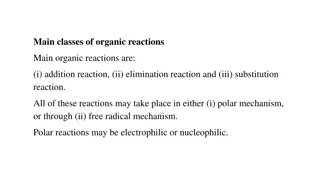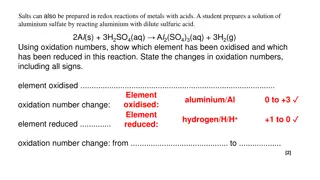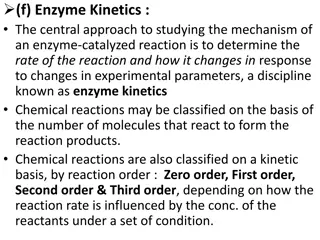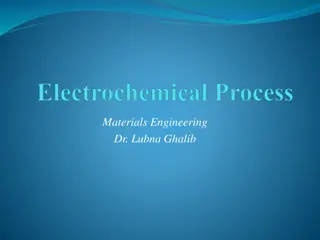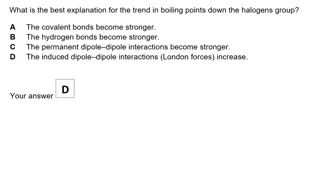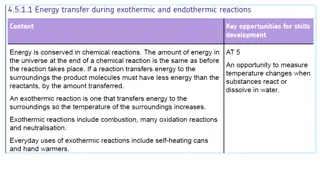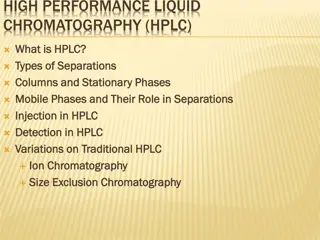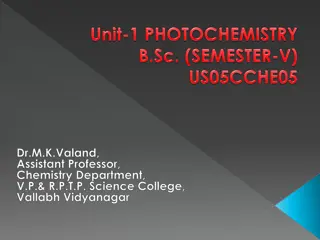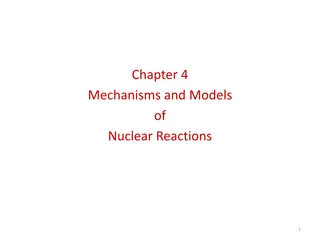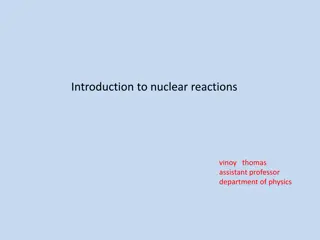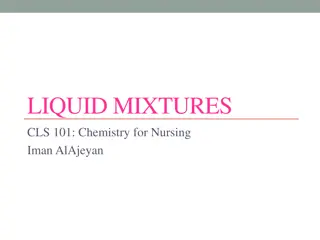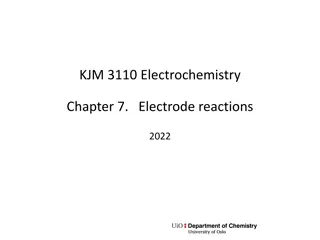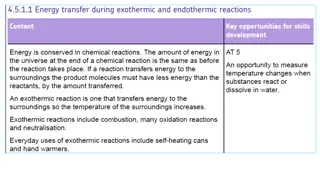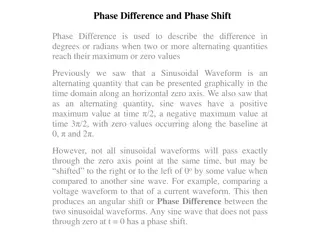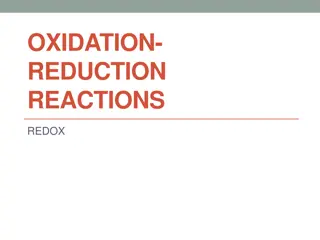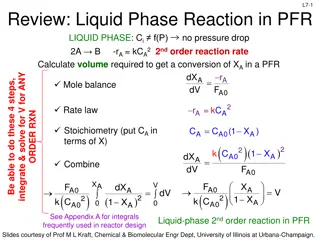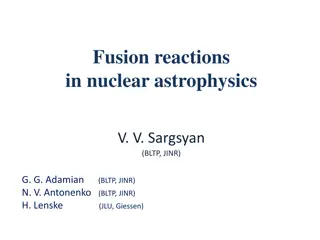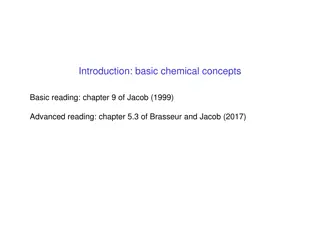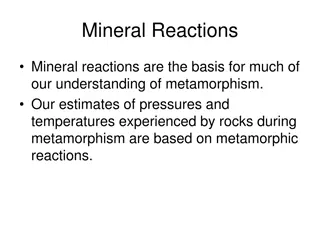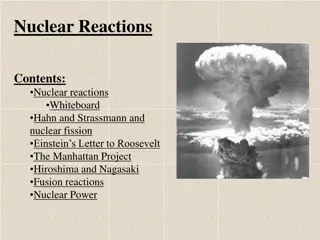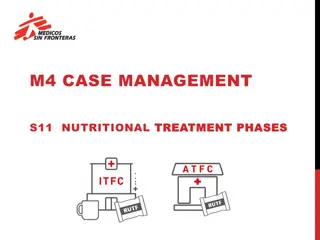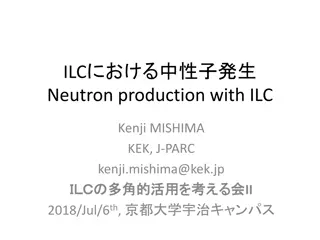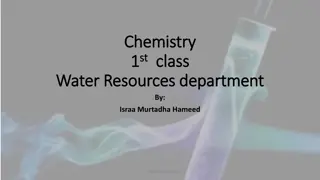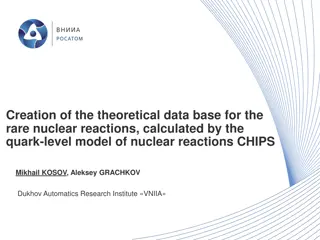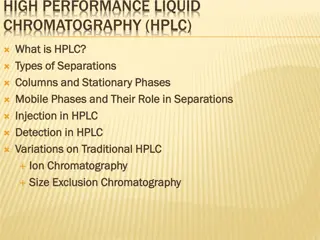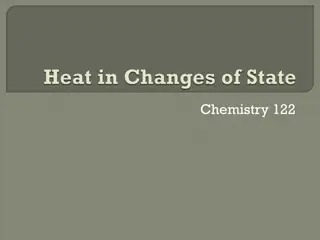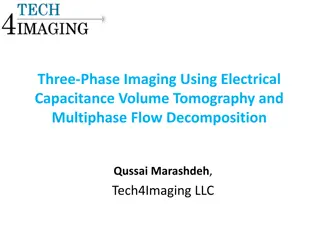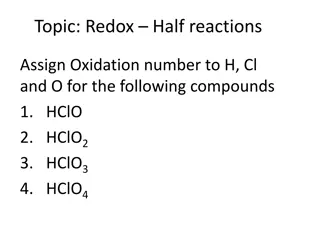Biochemical Reactions
Exploring the basics of chemical reactions, the conservation of matter principle, exothermic and endothermic reactions, and the role of activation energy in jumpstarting reactions. Learn how elements transform to create products, the significance of energy release or absorption, and the essential co
3 views • 19 slides
Overview of Serious Adverse Reactions and Transfusion Events
This data compilation covers the reporting trends, breakdown of reports, components issued, and specific types of adverse transfusion reactions experienced within the National Healthcare Organization (NHO) from 2019 to 2022. The information includes statistics on Serious Adverse Events (SAE), Seriou
2 views • 46 slides
Understanding RC Phase Shift Oscillators
Dive into the world of RC phase shift oscillators, exploring the concepts of phase and phase shift in electronic circuits. Learn how cascading RC networks can achieve specific phase shifts, the role of impedance, and the practical applications of RC feedback networks in oscillator circuits. Discover
1 views • 18 slides
Understanding the Three Stages of Project Life Cycle
The project life cycle consists of three key stages: pre-investment phase, construction phase, and normalisation phase. The pre-investment phase involves objective formulation, demand forecasting, and cost-benefit analysis. The construction phase focuses on building project infrastructure and invest
1 views • 5 slides
Gas-Liquid Equipment in Mass Transfer Operations
Gas-liquid operations play a crucial role in mass transfer processes by facilitating intimate contact between the two fluids for efficient interphase diffusion. Various equipment such as sparged vessels (bubble columns) and mechanically agitated vessels are used to disperse gas or liquid phases, pro
2 views • 27 slides
Understanding Three-Phase Power Systems and Instantaneous Power Flow
This detailed content delves into three-phase power systems, analyzing instantaneous power flow, balanced circuits, and trigonometric calculations. It explores the concept of constant three-phase power and provides insights into the analogy of a piston engine with infinite cylinders. The data includ
2 views • 9 slides
Liquid-Liquid Extraction Techniques and Considerations
Understanding liquid-liquid extraction processes like counter-current and co-current cascades, material balances, and system degrees of freedom. Topics include impact of flow rates, partition coefficients, solvent ratios, and purity on extraction efficiency.
0 views • 14 slides
Understanding Liquid Crystal Displays (LCDs) and Their Advantages
Liquid Crystal Displays (LCDs) offer advantages such as low power consumption, cost-effectiveness, and good contrast. These displays consist of liquid crystal cells sandwiched between glass sheets with transparent electrodes. The LCD relies on external illumination for visibility and uses nematic li
0 views • 14 slides
Overview of Organic Reactions and Mechanisms
Organic reactions can be categorized into addition, elimination, and substitution reactions, occurring through either polar or free radical mechanisms. Polar reactions may be electrophilic or nucleophilic, while free radical reactions involve radicals reacting to complete electron octets. Different
2 views • 26 slides
Understanding Redox Reactions in Chemistry
Salts can be prepared through redox reactions involving metals and acids. This interactive lesson covers oxidation numbers, identifying oxidized and reduced elements, and explaining electron transfer in redox reactions. Examples include reactions of aluminum with sulfuric acid and magnesium with cop
2 views • 12 slides
Exploring Enzyme Kinetics for Understanding Chemical Reactions
Enzyme kinetics is a vital discipline focusing on the rate of enzyme-catalyzed reactions and how they respond to varying conditions. Reactions are classified based on reactant concentration influences. Zero, first, second, and third order reactions are distinguished, with examples like first-order r
0 views • 31 slides
Understanding Electrochemical Processes in Materials Engineering
Electrochemical processes play a crucial role in materials engineering, specifically in the context of corrosion. These processes involve both oxidation (anodic reaction) and reduction (cathodic reaction) reactions occurring simultaneously. Maintaining a balance between these reactions is essential
3 views • 22 slides
Chemical Reactions and Separation Techniques in Chemistry
This presentation covers various chemical reactions and separation techniques in chemistry, including electron configuration, precipitation reactions, chlorine reactions with sodium hydroxide, and apparatus used to separate immiscible liquid layers. Explore topics such as electron configurations of
0 views • 28 slides
Understanding Energy Changes in Chemical Reactions
Exothermic reactions release energy to the surroundings, exhibited in processes like respiration and combustion. On the other hand, endothermic reactions absorb energy, demonstrated in examples such as photosynthesis. By observing changes in temperature and reactions between various substances, one
0 views • 24 slides
An Overview of High Performance Liquid Chromatography (HPLC)
High Performance Liquid Chromatography (HPLC) is a powerful analytical technique used for separating and identifying compounds in a mixture. It involves a mobile phase and a stationary phase to achieve separation based on different physicochemical properties. The mobile phase plays a crucial role in
0 views • 20 slides
Understanding Photochemical Reactions in Chemistry
Photochemistry is the study of chemical effects produced by light radiation. It involves different types of chemical reactions such as photochemical and thermal reactions, each influenced by various factors like light, temperature, and catalysts. This article explores the differences between thermoc
0 views • 17 slides
Mechanisms and Models of Nuclear Reactions
The chapter discusses the reaction cross-section in nuclear reactions, including resonance and tunneling phenomena. It explains the probability of reactions occurring, the influence of nuclear radius on cross-section, and how tunneling allows reactions at energies lower than the Coulomb barrier. Exa
0 views • 22 slides
Understanding Nuclear Reactions: A Comprehensive Overview
Nuclear reactions involve direct and compound scenarios, with direct reactions occurring in a short period and compound nucleus reactions leading to long-lived excited states. Different types of reactions like elastic scattering, break-up, and compound nuclear reactions are discussed, highlighting t
5 views • 11 slides
Understanding Liquid Mixtures in Nursing Chemistry
Explore the world of liquid mixtures in nursing chemistry with a detailed look at solutions, suspensions, colloids, and emulsions. Learn about the properties of solutions and suspensions, the distinction between homogeneous and heterogeneous mixtures, and the various types of liquid mixtures encount
7 views • 18 slides
Understanding Electrode Reactions in Electrochemistry
Exploring electrode reactions in electrochemistry involves delving into Faraday's law, coulometry, and the importance of sustainable electrode reactions. These concepts help us understand how the quantity of charge passed affects the production or consumption of substances in electrode reactions. As
4 views • 27 slides
Energy Changes in Chemical Reactions
Energy changes in chemical reactions can be categorized as exothermic and endothermic. Exothermic reactions release energy to the surroundings, while endothermic reactions absorb energy from the surroundings. Examples and uses of both types of reactions are provided, along with details on measuring
4 views • 24 slides
Understanding Hypersensitivity Reactions and Classification
Hypersensitivity reactions occur in sensitized hosts following contact with specific antigens, leading to injurious consequences. The Gell and Coombs Classification categorizes reactions into Type I, II, III, and IV based on immune response and duration. Type I reactions are immediate and humoral, w
0 views • 30 slides
Understanding Phase Difference and Phase Shift in Sinusoidal Waveforms
Phase difference and phase shift describe the angular displacement of sinusoidal waveforms in degrees or radians. These concepts are crucial in analyzing the relationship between alternating quantities such as voltage and current. The phase angle determines the shift of a waveform along the horizont
1 views • 26 slides
Understanding Oxidation-Reduction Reactions in Chemistry
Explore the concept of oxidation and reduction in chemistry, which are fundamental processes that occur simultaneously in oxidation-reduction reactions. Learn about the role of oxygen, different types of oxidation reactions beyond burning, such as bleaching stains, and the concept of reduction invol
0 views • 34 slides
Reactor Design Principles for Liquid and Gas-Phase Reactions
This material covers the design principles for liquid and gas-phase reactions in continuous flow reactors such as PFR (Plug Flow Reactor) and PBR (Packed Bed Reactor). It includes calculations for volume required to achieve a specific conversion, catalyst weight needed, and considerations for ideal
0 views • 21 slides
Key Fusion Reactions in Nuclear Astrophysics
Fusion reactions play a crucial role in nuclear astrophysics, with key reactions involving light elements such as Li, Be, B, and stable carbon isotopes. Understanding fusion of light heavy nuclei at extreme energies is essential for predicting stellar evolution. The S-factor provides a convenient re
0 views • 31 slides
Understanding Chemical Reaction Kinetics: From Unimolecular to Three-Body Reactions
Explore the fundamental concepts of chemical reactions, including unimolecular reactions like thermolysis and photolysis, bimolecular reactions, and three-body reactions. Learn about rate constants, reaction mechanisms, and the impact of pressure on reaction rates. Discover how energy transfer, phot
0 views • 9 slides
Understanding Mineral Reactions in Metamorphism
Mineral reactions play a crucial role in our comprehension of metamorphism, helping to estimate the pressures and temperatures rocks undergo. These reactions can be categorized as continuous or discontinuous, leading to different mineral products. Discontinuous reactions, exemplified by the transfor
0 views • 6 slides
Understanding Chemical Reactions and Catalysts
Chemical reactions involve the formation of new substances from reactants, with key processes like oxidation and reduction. Reversible reactions, endothermic and exothermic reactions, and the role of catalysts in speeding up reactions are explored. The significance of chemical symbols, formulas, and
0 views • 8 slides
Understanding Nuclear Reactions: Fission, Fusion, and Energy Release
This content covers various aspects of nuclear reactions, including nuclear fission, fusion reactions, the Manhattan Project, and examples of reactions involving different particles and elements. It explains concepts like exoergic and endoergic reactions, conservation of charge and nucleon number, a
0 views • 34 slides
Understanding Energy in Chemical Reactions
Chemical reactions involve the release or absorption of energy in various forms like heat, light, sound, and electricity. Exergonic reactions release energy, while endergonic reactions absorb energy. Catalysts speed up reactions, while inhibitors slow them down without changing the amount of reactan
0 views • 8 slides
Understanding Chemical Reactions in Daily Life
Understanding chemistry, particularly chemical reactions, is crucial for our daily lives. Chemical reactions involve the transformation of substances into different ones, described by reactants and products in equations. By learning about chemical equations, word equations, formula equations, and th
0 views • 15 slides
Understanding Nutritional Treatment Phases in Pediatric Malnutrition
This session covers the different phases of nutritional treatment in pediatric malnutrition programs, focusing on objectives, specifics, and criteria for transitioning between phases. An illustrative case of Annika, a 3-year-old in the Transition Phase, is provided for practical application and unde
0 views • 5 slides
Neutron Production Reactions at ILC - Applications and Estimations
Neutron production reactions at the International Linear Collider (ILC) involving nuclear reactions, photo-nuclear reactions with light and heavy nuclei, estimation of neutron production using gamma irradiation on Be-9, and application prospects. Cross-sections, energy inputs, and conversion rates a
0 views • 29 slides
Understanding Exothermic and Endothermic Reactions in Chemistry
In chemistry, it's essential to differentiate between exothermic and endothermic reactions based on the direction of heat flow. Exothermic reactions release heat to the surroundings, while endothermic reactions absorb heat to proceed. Through examples like the combustion of propane and the formation
0 views • 21 slides
Theoretical Data Base for Rare Nuclear Reactions Using Quark-Level Model
The creation of a theoretical data base for rare nuclear reactions using the CHIPS quark-level model is discussed in this research by Mikhail Kosov and Aleksey Grachkov from Dukhov Automatics Research Institute VNIIA. The study aims to predict cross-sections of unmeasured reactions, assess neutron-n
0 views • 18 slides
Understanding High Performance Liquid Chromatography (HPLC)
High Performance Liquid Chromatography (HPLC) is a powerful analytical technique used for separating compounds in a liquid mixture based on their interactions with the stationary phase and mobile phase. It involves different types of separations, columns, mobile phases, and detection methods. Isocra
0 views • 20 slides
Understanding Heat Transfer in Phase Changes of Water
Water molecules exhibit different behaviors in the liquid and gaseous states due to varying attractions between molecules. To change liquid water to a gas, energy must be added to overcome intermolecular forces, making this process endothermic. The heat absorbed during melting is equal to the heat r
0 views • 22 slides
Advanced Imaging Techniques for Three-Phase Flows in Reactor Systems
Gas-liquid-solid reactor systems require advanced measuring techniques to understand complex three-phase flows. Multi-Phase Flow Decomposition using Electrical Capacitance Volume Tomography (ECVT) offers innovative solutions for visualizing and quantifying phase hold-up distributions and dynamic cha
0 views • 17 slides
Understanding Redox Half Reactions: Assigning Oxidation Numbers and Half-Reactions
In this content, we explore assigning oxidation numbers to elements in compounds such as HClO, HClO2, HClO3, and HClO4. We then delve into the Haber Process to understand redox reactions. The concept of oxidation and reduction, as well as the significance of electrons in these reactions, is illustra
0 views • 20 slides
